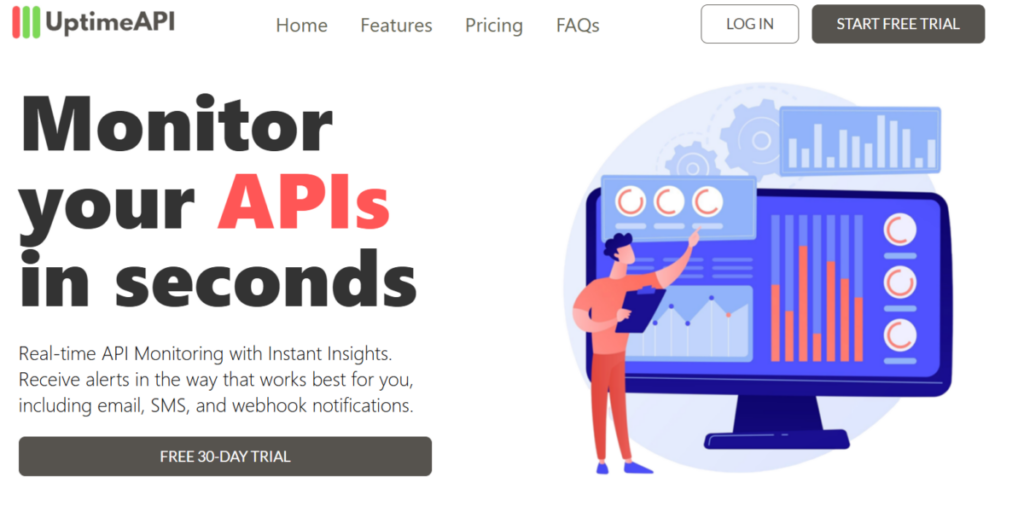In the dynamic world of software development, API performance tracking has become indispensable for maintaining smooth operations and ensuring optimal user experience. Uptime API delivers powerful real-time monitoring with instant insights that empower developers to oversee API performance and reliability. By providing essential metrics such as uptime, response times, and error rates, it allows developers to stay ahead of performance issues, ensuring seamless application functionality.
Uptime API: Real-Time Monitoring for Continuous Uptime
At the core of Uptime API is its robust real-time monitoring capability. APIs are monitored at set intervals, offering developers immediate alerts when performance deviates from expected norms. This proactive approach allows for early detection of problems like slow response times, timeouts, or outright failures. By identifying issues as they happen, developers can mitigate risks quickly, reducing downtime and ensuring applications meet user expectations consistently.
Uptime API provides customizable alerts tailored to the needs of individual development teams. Alerts can be configured based on specific performance thresholds, such as latency exceeding a set duration or an API endpoint becoming unavailable. These alerts are delivered via various channels, including email, SMS, and integrations with platforms like Slack. Developers have full control over which incidents trigger alerts, ensuring that critical issues are addressed immediately without overwhelming the team with unnecessary notifications.
Comprehensive Error Logging for In-Depth Analysis
In addition to real-time monitoring, Uptime API offers extensive error logging that records every incident. These logs provide valuable insights into the nature, frequency, and impact of errors, allowing developers to conduct root-cause analysis. By reviewing historical data, teams can identify patterns or recurring issues, enabling them to implement permanent solutions. This data-driven approach enhances the overall stability and performance of APIs over time.
For development teams distributed across different locations or relying on various communication tools, Uptime API’s multi-channel notification is a game-changer. It supports integrations with platforms such as Microsoft Teams, PagerDuty, and webhooks. It ensures that alerts are delivered where they are most effective. This ensures that no critical issue goes unnoticed, even in diverse or remote work environments.
Example Request
{
"name": "Horoscope API Monitor",
"team_id": 1,
"method": "POST",
"url_or_ip": https://zylalabs.com/api/891/horoscope+api/3527/by+date,
"interval": "every_60_sec",
"timeout": 30,
"alert_when": "kwd_not_exists",
"keyword_to_check": "Horoscope",
"headers": {
"Authorization": "Bearer API_Key"
},
"parameters": {
"sunsign": "gemini",
"date": "2022-05-16"
}
}Uptime API: Historical Data and Performance Trends
Uptime API’s value extends beyond real-time monitoring with its ability to track and analyze historical performance data. Developers can visualize trends in API performance over weeks, months, or even years, providing a long-term perspective on API health. This feature is particularly useful for ensuring compliance with service-level agreements (SLAs). Also, It good for planning infrastructure upgrades or optimizations based on past performance metrics.
Whether you’re managing a single API for a startup or hundreds of APIs for a large enterprise, Uptime API is designed to scale with your needs. Its flexible pricing plans accommodate different levels of monitoring, ensuring that both small and large teams have access to reliable performance tracking. As a business grows, Uptime API can seamlessly expand its monitoring capabilities, making it a future-proof solution for any organization.
Conclusion: API Performance Tracking
In a digital landscape where application reliability is paramount, Uptime API provides developers with a critical edge through its API performance tracking capabilities. From real-time monitoring and customizable alerts to in-depth error logging and historical data analysis, Uptime API ensures that developers can maintain high-performing, reliable APIs. By leveraging Uptime API, organizations can proactively manage performance issues, reduce downtime, and deliver superior user experiences.


